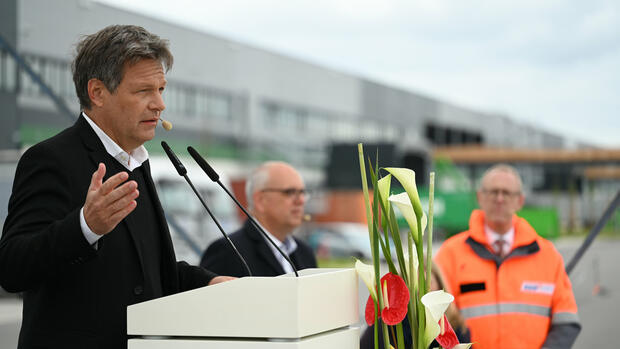With Germany’s largest connected solar system on the roof, the logistics center largely supplies itself with electricity.
(Photo: dpa)
Bremen Two dozen driverless transport pallet trucks race through the 82,000 square meter building in Bremen with its towering shelving walls. Controlled invisibly, they transport your stored goods in the direction of outgoing goods. Shielded by safety grilles, four Kuka robots, whose complex work steps do not require any workers, produce the necessary pallets and packaging right next door.
The massive goods hub assembles and ships car parts for assembly in Egypt, India and four countries in the Far East for the customer Mercedes. The operator, the state-owned Bremen seaport and logistics company BLG, has given the new building on the Weser a self-sufficient energy supply as a highlight. On the roof, with more than 80,000 square meters, is “the largest continuous photovoltaic system in Germany”, as CEO Frank Dreeke assures.
He calculates that the solar power is enough to supply 2,400 households or a corresponding number of industrial customers. BLG, which was founded almost 150 years ago as a port company, also becomes a power plant operator. The building, called “C3” (“Customer, Climate, Comfort”), which is connected to road, rail and waterways, is considered a beacon project for warehouse logistics throughout Germany – and a blueprint for future hubs. It was opened on Tuesday by Federal Economics Minister Robert Habeck (Greens).
Habeck speaks of a “very strong sign” for the improvement of sustainable energy supply and supply chain security, which is associated with the property. BLG, some of which is listed on the stock exchange as “Bremer Lagerhaus Gesellschaft 1877”, is also hoping for economic gains. “The investments will have paid off by the end of the contract period with Mercedes-Benz,” Dreeke told the Handelsblatt. The outsourcing agreement expires in 2027 – for now.
The XXL logistics system, which is characterized by a particularly efficient building shell, air heat pumps and intelligent lighting control, should make it easier for BLG to retain more customers. “We want to reduce CO2 emissions with the support of our production partners,” confirms Mercedes-Benz Board Member for Production Jörg Burzer. The Bremen property makes a further contribution to climate protection.
According to sources, the contract with Volkswagen has expired
BLG’s commitment to working climate-neutral from 2030 is also helpful here. Because the advertising argument will probably come in handy for the Bremen logistician. In recent years, several car customers have had to be handed over to the competition.
Among other things, the order from BMW in Wackersdorf, which was only landed in 2012, was lost, where the competitor Schnellecke Logistics is now in charge. From there, BLG had previously organized the dispatch of materials for the Munich car manufacturer’s foreign production facilities. The contract concluded with Volkswagen in 2010 to supply the Wolfsburg-based company’s worldwide production sites with more than 3,000 car parts no longer exists, according to BLG circles.
Otherwise, the business of the Bremen seaport and handling center operator is mixed. A few days ago, BLG reported a pre-tax profit of almost 56 million euros for 2022 with sales of 1.1 billion euros, which is already a record result.
>> Read also: Habeck lets Cosco fidget with the planned port entry in Hamburg
A targeted merger of the 50 percent subsidiary Eurogate with the previous competitors in Hamburg and Wilhelmshaven has been on hold for months, despite the announced agreement. Dreeke believes that the negotiations cannot be expected to progress before 2025.
BLG is also concerned about the group’s own car loading business in Bremerhaven. The division turned over 400,000 fewer vehicles last year than in the previous year and was in the red. According to Dreeke, a reorganization of the work processes should now stabilize operations. However, job cuts are taboo until mid-2024 due to a collective agreement to secure jobs.
The CEO told the Handelsblatt that they no longer want to rely on German export business in the future. “New manufacturers from China in particular are pushing their way onto the German market,” he says, giving an insight into the future strategy. “We are already in talks with some of them.” The proportion of BLG’s export and import business in automotive logistics will probably shift as a result.
However, Dreeke has already let one potential customer slip through his fingers. A few days ago, the Chinese automotive group SAIC awarded the contract for the port logistics for its MG brand to its competitor Mosolf. From Wilhelmshaven, he will now take care of unloading the loads, the pre-delivery inspections and the hinterland distribution of the former British car brand.
More: How the German North Sea ports are fighting for survival
